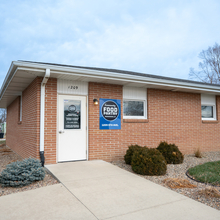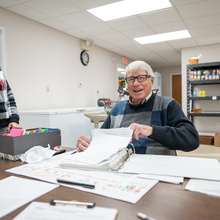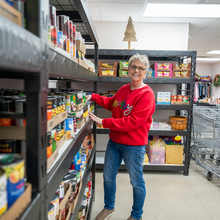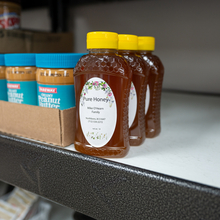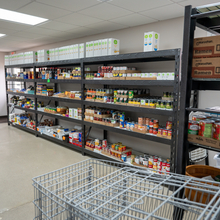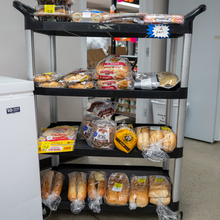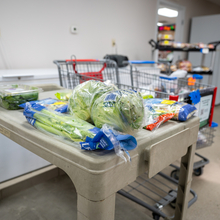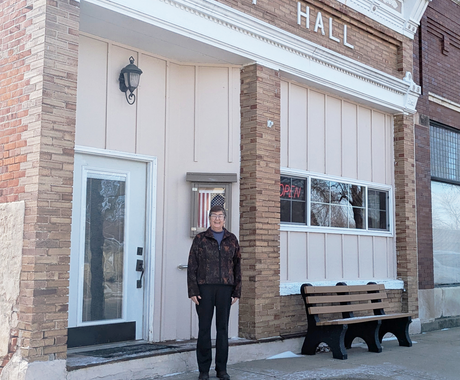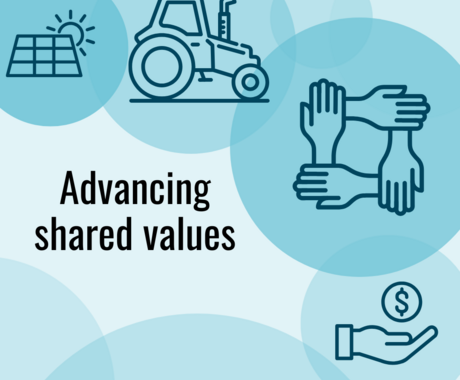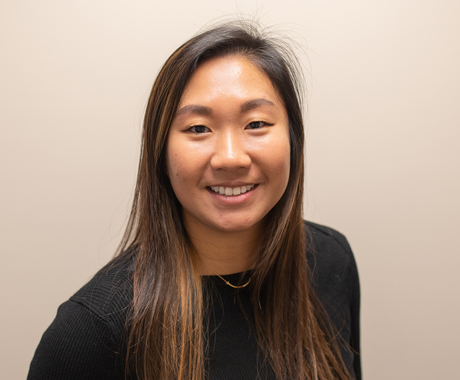If dedicated volunteers and generous donations from the community are the key to running a successful small-town food pantry, the people of Shenandoah, Iowa, have it figured out.
Since 1984, the Shenandoah Food Pantry has served residents in six communities in southwest Iowa: Shenandoah, Essex, Farragut, Blanchard, Coin, and Northboro. What started off in a small rented room in a local church now occupies an entire building.
“Six years ago, we purchased the building we’re now in,” said Jeannine Liljedahl, president/director of the food pantry. “A donor gave us money to buy it. Everything is all on one level, it’s handicap accessible, and we have so much more room.”
They also have the capacity to help more people.
“We were open two mornings a week, and if we had two clients a week that was a lot,” she said. “Over the years, I have seen many more people, and now a lot of families with children.”
All items at the pantry are available because of donations, whether monetary or in the form of food and supplies. The new space offers separate areas for grocery-type items, coats and clothing, books, and more. This year, the pantry also had access to funds from a mini-grant obtained with help from the Center for Rural Affairs.
Deborah Solie, project associate with the Center, helped guide Jeannine through the process.
“By assisting the pantry in applying for a mini-grant, we were helping sustain the vital work being done in their community and the surrounding areas," Deborah said. "We wanted to partner with the food pantry to strengthen the local food system by supporting area producers and providing fresh, healthy produce to residents who might not otherwise be able to afford it.”
With the grant funds, the pantry has been able to offer its clients honey, which is a rare commodity at food pantries.
“We never had the money to buy something like this,” Jeannine said. “Honey can be used in so many different ways and lasts a long time. Honey is very expensive, so the grant has been a huge help. We’ve been able to buy honey from a local producer, and the people love it.”
She has ordered honey twice from O’Hearn Family Honey of Northboro, Iowa, about 48 jars each time depending on what he has available. She thinks she’ll be able to order at least one more time with the rest of the grant money.
The pantry also buys fresh produce for its clients. Because of the generosity of community members and local businesses and organizations, it hasn’t had to buy much this season. Even Shenandoah Medical Center donated some produce from its educational community garden project.
“People seem more aware of the need,” Jeannine said. “Our clients love fresh produce. We’ve been very lucky to receive so many donations.”
The food pantry is run by about 100 volunteers, most of whom work once a month. It also has an 11-member board.
“We have such dedicated volunteers,” Jeannine said. “Volunteer support is huge. The communities we serve are supportive of the pantry, and so are the churches.”
Clients must get a referral to use the food pantry, usually through West Central Community Action in Shenandoah, which offers low-income resources to help Iowa families and directs people in need to the food pantry.
Referrals can also come from pastors, medical centers, veteran assistance, mental health practitioners, and more. Once clients have a referral, they can make an appointment to get what they need.
“It’s pretty easy to get a referral; we want to help as many people as possible,” Jeannine said. “Our volunteers have a sheet with products listed. We have carts, and people shop like a grocery store. We want people to have dignity in their lives and be able to pick things off the shelf that they want. Also, volunteers doing this one on one with a client is a good thing. It’s confidential and there's no judgment. I think that’s very important to remember.”
Clients can visit the pantry nine times per calendar year. After that, they have access to emergency supplies provided by the U.S. Department of Agriculture.
“We are temporary assistance and can't do groceries every week,” Jeannine said. “Just to be able to serve the members we do, we have to limit their times. We have more business toward the end of month when people are out of food stamps and such, like most pantries. Last week we had 50 referrals, with families with adults and children.”
Jeannine said they are always looking for more ways to provide assistance and recently added an additional refrigerator/freezer to allow them to offer more food options.
“We need to look into more ways to apply for grants,” she said. “We wouldn't have known we could apply for things like that if the Center hadn’t helped us, so I’ll definitely ask the staff if there are more grants or other places to apply.”
The success and longevity of the Shenandoah Food Pantry comes back to a simple idea: Care about your neighbors and treat everyone with dignity.
“If we get food that we wouldn’t eat, like spoiled fruit or vegetables, then we wouldn’t offer it to our clients, but we don't see much of that,” Jeannine said. “People are very careful about that. You have to love your clients, too. A lot of these people we see become friends with volunteers. It’s really a positive thing.“
When volunteers feel like they’ve helped someone in their daily lives, it makes a big difference, she said, and it shows in the work they do.
“Everyone needs to feel like they have a purpose. Volunteers are the heart of the food pantry. We are so thankful for the grant, and to be able to try something different for our clients.”
Feature photo: Jeannine Liljedahl holds up some of the honey purchased through a mini-grant obtained with help from the Center for Rural Affairs.
All photos by Kylie Kai. Click to enlarge.


